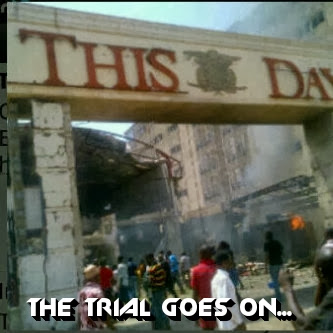The Abuja Division of the Federal High Court will on Monday, 30th September, 2013, resume the trial of the alleged kingpin of Boko Haram sect, Mustapher Umar, who allegedly bombed office of the Thisday office in Kaduna State with 12 camp gas cylinders.
The
High Court, presided over by Justice Ademola Adeniyi, had heard how the
accused person wept bitterly when he was rescued from a badly burnt
Honda car that was allegedly used for the operation, saying he had been
denied the opportunity of inheriting 72 virgins in heaven.
In
a bid to prove the complicity of the accused person, the Federal
Government, brought a senior police officer in charge of exhibits
recovered from terror suspects, to testify as the ‘PW-8′ in the trial.
The
masked witness who narrated how the accused person had intended to
carry out a suicide attack, produced the burnt Honda Car, discharged
Cylinders, half charred 25 litter jerry-can that allegedly contained
fuel, which he said were used for the terrorist attack on three media
houses based in Kaduna.
Other
media outlets affected by that attack on the premises of SOJ Plaza in
Kaduna State on April 26, 2012, which allegedly led to the death of 10
persons, included the Moment and the Sun Newspapers.
The
court had earlier watched a video clip where the accused person
confessed that he was sent to bomb Thisday Newspaper owing to a report
he said did not only put Islam in false light, but greatly insulted
Prophet Mohammed.
The
accused person, in the video which was admitted into evidence by the
trial court, said his action was to avenge the insult he said was meted
to “Allah” through the media house.
However,
the suspect has since challenged the credibility of the video evidence,
insisting that he was forced under duress to confess to the crime.
The
accused person told the high court that he was badly manhandled and
tortured by security operatives, even as he alleged that the video was
doctored.
Consequently,
counsel to the accused person, Mr. Nureni Suleiman, has urged the court
to discountenance the proof of evidence tendered before it by the
government and order that the prosecution failed to establish a
prima-facie case against his client.
According
to a one-count criminal charge that was preferred against the accused
person, his act of terrorism ran contrary to section 1(2) (c) (r) of
Terrorism Prevention Act, 2011, punishable under section 33 (1) (a) of
the same Act.
It will be recalled that the court had ab-initio barred members of the public from attending the trial, except lawyers involved in the case and journalists.
READ MORE: http://news.naij.com/48480.html























0 comments:
Post a Comment